|
|
|
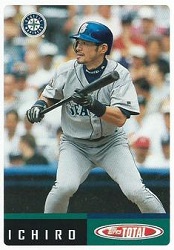 The 2001 Seattle Mariners defeated the 2002 San Francisco Giants four games to three to win the Best of 2000s World Series. It was a classic battle between the best team of the decade against arguably the best hitter of the decade, and two teams that came up short of real-life championships.
The 2001 Seattle Mariners defeated the 2002 San Francisco Giants four games to three to win the Best of 2000s World Series. It was a classic battle between the best team of the decade against arguably the best hitter of the decade, and two teams that came up short of real-life championships.
Seattle had the better record and hosted games 1 and 2, earning victories in both. In Game 1, Bret Boone's two-run home run proved the difference as Jamie Moyer beats Jason Schmidt. Aaron Sele beats Kirk Rueter in Game 2 as Boone homers again, as well as a homer from Dan Wilson, and outstanding relief pitching from Seattle's bullpen.
The series goes to San Francisco for three games, and the Giants win them all. In Game 3 SF's Russ Ortiz beats Freddy Garcia with help from David Bell, who is on both teams, driving in two runs. In Game 4 it's Livan Hernandez vs Paul Abbott, where the Mariners take a 4-3 lead into the 7th but their usually reliable bullpen blows the game and the Giants win 5-4, evening the series 2-2. Game 5 pits Schmidt against Moyer again, and the key blow in this game is a three-run homer from Tsuyoshi Shinjo as the Giants hang on for a 4-2 victory and pull within one game of an elusive championship for Barry Bonds.
The pressure is on Seattle back home for Game 6 as Sele faces Rueter again. Seattle slowly builds a lead and this time the bullpen is outstanding in getting out of some tight spots in a 6-1 victory that sends the series to a deciding 7th game. In Game 7 it's Ortiz against Garcia again. Bret Boone's sac fly in 4th inning gives Mariners a 1-0 lead and Garcia is outstanding from there, out-pitching Ortiz who was also excellent. In the 7th, Mike Cameron breaks it open with a bases loaded double as the Mariners plate five runs and take a 6-0 lead. In the 9th, Kazuhiro Sasaki replaces a tiring Garcia, and with two outs does give up a two-run homer to Jeff Kent, but then strikes out Reggie Sanders for the final out as Seattle wins the championship that eluded them in 2001.
World Series Game 7: '01 Mariners 6; '02 Giants 2
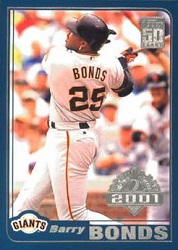 After battling all season for the NL West title, the Dodgers face the Giants in the NLCS. The Giants led the NL West most of the season before a late slump allowed the Dodgers to pass them and claim the division and home field advantage. Jeff Kent homers and drives in five as the Giants easily win Game 1, which also sees a pair of home runs from Reggie Sanders. A dominant outing from Russ Ortiz gives the Giants the win in Game 2 and they head home having taken both games in LA. The Dodgers take a 3-0 lead into the 8th inning in Game 3, but the Giants rally behind a pinch homer from Ramon Martinez and claim the 4-3 victory to take a commanding series lead. The Giants waste no time in Game 4 jumping on the Dodgers, scoring three in the 1st inning on Barry Bonds three-run blast. The Giants just keep pouring it on, eventually taking a 9-1 lead and sweeping the Dodgers in four straight games.
After battling all season for the NL West title, the Dodgers face the Giants in the NLCS. The Giants led the NL West most of the season before a late slump allowed the Dodgers to pass them and claim the division and home field advantage. Jeff Kent homers and drives in five as the Giants easily win Game 1, which also sees a pair of home runs from Reggie Sanders. A dominant outing from Russ Ortiz gives the Giants the win in Game 2 and they head home having taken both games in LA. The Dodgers take a 3-0 lead into the 8th inning in Game 3, but the Giants rally behind a pinch homer from Ramon Martinez and claim the 4-3 victory to take a commanding series lead. The Giants waste no time in Game 4 jumping on the Dodgers, scoring three in the 1st inning on Barry Bonds three-run blast. The Giants just keep pouring it on, eventually taking a 9-1 lead and sweeping the Dodgers in four straight games.
The Mariners host the Twins in the ALCS. Johan Santana pitches well in Game 1 on the road, and the Twins take a lead into the 9th inning, but Edgar Martinez rips a two-run game winning homer off Joe Nathan and the Mariners take Game 1. Minnesota's Francisco Liriano is dominant in Game 2 as the Twins even the series, aided by another big game from Justin Morneau who had an excellent post-season for Minnesota. Seattle's Freddy Garcia was also outstanding in October, and in Game 3 back in Minnesota he shuts down the Twins as Seattle wins a blowout by an 11-1 score. Morneau strikes again in Game 4 as the Twins rally from behind before Rondell White delivers the game-winning hit in a 7-6 Minnesota victory that evens the series 2-2. Game 5 is a pivotal and dramatic game - Santana and Jamie Moyer are excellent, and the Twins take a 2-1 lead into the 9th inning. With two outs, Nathan allows a solo homer to Mark McLemore that ties the game and forcing extra innings. The Twins come close to winning multiple times, but can't get the winning run, including an epic base-running blunder from Joe Mauer. In the 15th inning, McLemore leads off with a triple, and later scores the go-ahead run. With bullpens drained, Joel Piniero gets two scoreless innings for Seattle who sneaks out of Minnesota with a critical 3-2 victory to take a 3-2 series lead. Seattle returns home for Game 6 to try to close out the series, but Mauer redeems himself with a big homer and Liriano is again excellent as the Twins push the series to Game 7.
Game 7 is another extra inning classic as Brad Radke faces Garcia to see who advances to the World Series. Mauer continues his redemption with a two-run homer in the 6th that gives Minnesota a 3-1 lead. Seattle, as they did all post-season, won't die. They piece together two runs in the 7th inning to tie the game, then threaten to win in the 9th before the Twins escape a jam with a key double-play. Twins threaten to take lead in 10th and 11th innings but are unable to score. In the 14th, Joe Nathan, pitching on fumes, gives up a game-winning single to Mike Cameron and the Seattle crowd goes nuts!
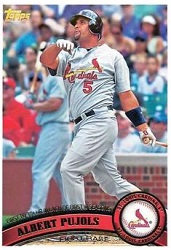 The first NLDS series featured the '02 San Francisco Giants against the '04 St. Louis Cardinals. The Giants quickly steal home-field advantage with a blowout win in Game 1 as Jeff Kent and David Bell go deep and Jason Schmidt records the victory. The Cards are in trouble in Game 2, down 5-3 in the 9th, but they rally to tie the game on Scott Rolen's RBI, only to lose in 11 innings giving the Giants a commanding 2-0 lead heading back home. The Cardinals look to avoid the sweep in Game 3, and when Barry Bonds launches a 1st inning two-run homer it looks bad for St. Louis, but Marquis is solid and the offense comes to life in a 4-2 victory that ends when Jason Isringhausen gets Bonds to fly out harmlessly with two on to end the game. Cards' Albert Pujols had been silent to this point, but he erupts in Game 4 with four hits, a homer and five RBI as the Cardinals rout the Giants 13-4 to send the series back to St. Louis for a deciding fifth game. Schmidt faces Chris Carpenter to see who advances to the NLCS, and the game goes to extra innings tied 3-3 (with pinch hitter Larry Walker hitting a two-run homer to tie the game in the 7th inning), but the Giants continue to get big contributions from players like Rich Aurilia, Kenny Lofton and David Bell as they score three in the 11th to take a 6-3 lead. The Cards threaten in the bottom half, but speedy Tony Womack hits into a double-play that ends the game and sends the Giants to the NLCS against the rival Dodgers.
The first NLDS series featured the '02 San Francisco Giants against the '04 St. Louis Cardinals. The Giants quickly steal home-field advantage with a blowout win in Game 1 as Jeff Kent and David Bell go deep and Jason Schmidt records the victory. The Cards are in trouble in Game 2, down 5-3 in the 9th, but they rally to tie the game on Scott Rolen's RBI, only to lose in 11 innings giving the Giants a commanding 2-0 lead heading back home. The Cardinals look to avoid the sweep in Game 3, and when Barry Bonds launches a 1st inning two-run homer it looks bad for St. Louis, but Marquis is solid and the offense comes to life in a 4-2 victory that ends when Jason Isringhausen gets Bonds to fly out harmlessly with two on to end the game. Cards' Albert Pujols had been silent to this point, but he erupts in Game 4 with four hits, a homer and five RBI as the Cardinals rout the Giants 13-4 to send the series back to St. Louis for a deciding fifth game. Schmidt faces Chris Carpenter to see who advances to the NLCS, and the game goes to extra innings tied 3-3 (with pinch hitter Larry Walker hitting a two-run homer to tie the game in the 7th inning), but the Giants continue to get big contributions from players like Rich Aurilia, Kenny Lofton and David Bell as they score three in the 11th to take a 6-3 lead. The Cards threaten in the bottom half, but speedy Tony Womack hits into a double-play that ends the game and sends the Giants to the NLCS against the rival Dodgers.
The second NLDS series featured the '08 Phillies against the '09 Dodgers. The first game is a good one, as the Dodgers win 6-5 in 10 innings on Casey Blake's game-winning RBI - Blake would drive in three in the win. Philly bounces back with a 4-3 win in Game 2 behind a big Ryan Howard two-run homer to earn the split in Los Angeles, as Brad Lidge records the save. The Dodgers re-take control of the series with a 3-2 11 inning victory in Game 3 that features great pitching from Clayton Kershaw and Brett Myers. Blake strikes again with the go-ahead RBI in the 11th, and Dodgers closer Jonathan Broxton strikes out Pedro Feliz to end the game. The Dodgers get to Philly starter Joe Blanton early in Game 4, and when Dodgers' starter Chad Billingsley adds a two-run homer it only adds insult to injury. The Dodgers roll to a 9-4 victory and win the series 3-1 when Broxton strikes out Chase Utley, who had a disappointing series, to end the game.
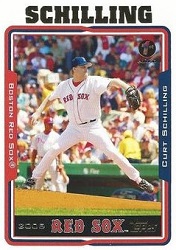 The first ALDS series features division winners as the '04 Boston Red Sox face the '06 Minnesota Twins. Aces face off in Game 1 as Curt Schilling faces Johan Santana. Boston takes a 4-1 lead into the 9th, but Minnesota rallies against closer Keith Foulke, scoring four times to take a 5-4 lead and earn the win. Pedro Martinez is outstanding in Game 2, going 6.2 scoreless innings and striking out seven as Boston earns a 3-0 victory to even the series. The bullpen lets Boston down again in Game 3, as the Red Sox take a 3-1 lead into the 6th, only to watch Justin Morneau hit his second homer of the game to put Minnesota ahead in an eventual 7-3 victory and strong outing from Brad Radke. In Game 4, the Twins take a 5-4 lead into the 8th, but Boston rallies, scoring three runs to take a 7-5 lead and setting the stage for a potential Schilling vs Santana rematch in Game 5... but Minnesota has other plans, again rallying against a struggling Boston bullpen when Torii Hunter blasts a three-run homer in the 8th to put Minnesota up 8-7. Joe Nathan retires the Sox in order in the 9th and there will be no October miracle this time for Boston.
The first ALDS series features division winners as the '04 Boston Red Sox face the '06 Minnesota Twins. Aces face off in Game 1 as Curt Schilling faces Johan Santana. Boston takes a 4-1 lead into the 9th, but Minnesota rallies against closer Keith Foulke, scoring four times to take a 5-4 lead and earn the win. Pedro Martinez is outstanding in Game 2, going 6.2 scoreless innings and striking out seven as Boston earns a 3-0 victory to even the series. The bullpen lets Boston down again in Game 3, as the Red Sox take a 3-1 lead into the 6th, only to watch Justin Morneau hit his second homer of the game to put Minnesota ahead in an eventual 7-3 victory and strong outing from Brad Radke. In Game 4, the Twins take a 5-4 lead into the 8th, but Boston rallies, scoring three runs to take a 7-5 lead and setting the stage for a potential Schilling vs Santana rematch in Game 5... but Minnesota has other plans, again rallying against a struggling Boston bullpen when Torii Hunter blasts a three-run homer in the 8th to put Minnesota up 8-7. Joe Nathan retires the Sox in order in the 9th and there will be no October miracle this time for Boston.
The second ALDS series features two western teams as the '01 Seattle Mariners, who had the best record in all of MLB, face the '01 Oakland A's. Oakland's powerful offense flexes their muscles in an 8-4 win in Game 1 as Eric Chavez homers and drives in three and lefty Mark Mulder is strong in victory. Game 2 sees a good duel between Tim Hudson and Jamie Moyer. With the game tied 1-1 in the 8th, Chavez hits a two-run double that has the A's fans thinking upset, but Seattle has a rally of their own as Bret Boone hits a three-run double to put Seattle back up 4-3, a lead they hold as Kaz Sasaki earns the save. Back in Oakland for Game 3, the A's again lead 4-3 in the 6th but Seattle gets back-to-back homers from Ichiro and Mike Cameron to take back the lead, and again, the Mariners outstanding bullpen escapes some tricky spots to get the 6-4 victory. In Game 4, A's starter Corey Lidle is outstanding in a 1-0 victory with Chavez providing the only offense with a solo homer as the series heads back to Seattle for a deciding 5th game. Game 5 is an instant classic - Game 1 starters Mulder and Freddy Garcia get the call. Miguel Tejada rips a two-run homer in the 2nd inning, but Seattle replies with three runs in the 3rd inning. Mulder and Garcia are outstanding from there, and Seattle takes 3-2 lead into 9th inning. Norm Charlton gets the first two out and Seattle fans are ready to celebrate, but Sasaki replaces Charlton and Jermaine Dye blasts a game-tying solo homer that stuns the home crowd. Chavez then doubles and advances to third on an error, but Arthur Rhodes replaces Sasaki and gets Jeremy Giambi to strikeout to keep the game tied. In the bottom of the 9th, Mike Cameron leads off with a single and steals second base. After Edgar Martinez is intentionally walked, Cameron advances to third on John Olerud's ground out. A's closer Jason Isringhausen comes in to face Bret Boone, and Boone rips a game-winning single to right, scoring Cameron, and advancing the Mariners to the ALCS.
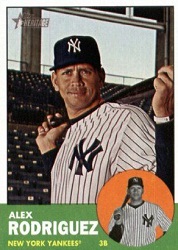 My best of 2000s baseball league uses the general idea of picking each franchiseís best team from 2000-2009. Defining what is a franchiseís best team isnít always so clear, as sometimes a team with a great regular season record may not win a title when another yearís team is statistically inferior, but does win the title (think 2006 Cardinals vs 2004 Cardinals). In some cases, when there were numerous candidates, like the 2004 and 2007 champion Boston Red Sox, I pick the team with the best collection of players I want represented, or the most historically significant. Some of the tougher choices for this replay were the 2008 Cubs over the 2003 team, which came closer to the World Series before the infamous Steve Bartman incident and collapse, but clearly wasn't as good as the '08 squad. I also picked the 2002 Arizona Diamondbacks over the champion 2001 team, as I thought they were a slightly better squad, and I didn't really want Luis Gonzalez' 57 home run season as that seemed an outlier. Another tough call was the Houston Astros, and I picked their 2004 team ahead of the 2005 team that made it to the World Series. The Yankees had several excellent teams early in the decade, but I picked the 2009 team as it had a cast almost entirely different from the 1998 team that won my Best of 1990s replay.
My best of 2000s baseball league uses the general idea of picking each franchiseís best team from 2000-2009. Defining what is a franchiseís best team isnít always so clear, as sometimes a team with a great regular season record may not win a title when another yearís team is statistically inferior, but does win the title (think 2006 Cardinals vs 2004 Cardinals). In some cases, when there were numerous candidates, like the 2004 and 2007 champion Boston Red Sox, I pick the team with the best collection of players I want represented, or the most historically significant. Some of the tougher choices for this replay were the 2008 Cubs over the 2003 team, which came closer to the World Series before the infamous Steve Bartman incident and collapse, but clearly wasn't as good as the '08 squad. I also picked the 2002 Arizona Diamondbacks over the champion 2001 team, as I thought they were a slightly better squad, and I didn't really want Luis Gonzalez' 57 home run season as that seemed an outlier. Another tough call was the Houston Astros, and I picked their 2004 team ahead of the 2005 team that made it to the World Series. The Yankees had several excellent teams early in the decade, but I picked the 2009 team as it had a cast almost entirely different from the 1998 team that won my Best of 1990s replay.
Teams play a full 162 game schedule with no cancellations. The playoff format is that four teams from each league make the post-season. The division winners are seeded 1, 2 and 3, with the next best record earning the wildcard spot. In the event of a tie, to avoid playing one-game playoffs, the team with the better head-to-head record wins, and if this results in a tie, then the better run differential gets the nod - in this replay, Philadelphia and Atlanta tied for the NL East title, but Philly had a 10-9 head-to-head advantage and wins the division - unfortunate for Atlanta as they didn't have a good enough record for the wildcard. Best record determines all playoff seeding. In the first round of the playoffs, a best of five, the 4 seed plays the 1 seed, while the 3 plays the 2 in a 2-2-1 format. The next two rounds, the Championship Series and the World Series, are both best of seven, with the team with the higher seed having home field advantage. I use a 2-2-1-1-1 format in all seven game series.
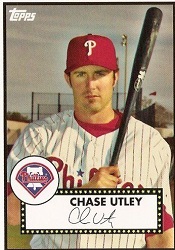 The '08 Philadelphia Phillies won the NL East with an 88-74 record, which actually tied with the '03 Atlanta Braves who also went 88-74 in this league, but Philadelphia won the tie-breaker by virtue of a better head-to-head record (I decided to not do one game playoffs in tie situations). Unfortunately for Atlanta, their record was not good enough to earn the NL wildcard berth, as that went to the San Francisco Giants. The '08 Phillies (real-life 92-70, World Series champions) got a great season from second baseman Chase Utley, who hit .305 with 41 home runs, 123 RBI and 116 runs scored. Despite a slow start, slugger 1B Ryan Howard finished with 43 home runs and 122 RBI while speedy shortstop Jimmy Rollins hit .306 with 104 runs scored and 52 stolen bases and outfielder Pat Burrell added 36 home runs and 98 RBI. The '08 Phillies pitching was led by Cole Hamels (12-10, 3.61 ERA) and Jamie Moyer (14-6, 3.91 ERA) while closer Brad Lidge recorded 40 saves with a 2.37 ERA. The '03 Braves (real-life 101-61, lost NLDS) actually led the East for a majority of the season before Philadelphia caught them. A powerful lineup featured outfielder Gary Sheffield, who hit .310 with 27 homers, 103 RBI and 108 runs, fellow outfielder Chipper Jones (.300, 20 HR, 92 RBI), center fielder Andruw Jones (.239, 34 HR, 101 RBI), catcher Javy Lopez (.268, 32 HR, 104 RBI) and second baseman Marcus Giles (.316, 24 HR, 97 runs) while speedy shortstop Rafael Furcal stole a team-high 25 bases. While the pitching wasn't up to 1990s level, it was still a strong roation that featured aging Greg Maddux (14-11, 3.98), Mike Hampton (12-11, 3.75 ERA), Shane Reynolds (12-8, 3.81 ERA) and Russ Ortiz (12-10, 4.15 ERA). Former starter John Smoltz had been converted to closer, and was outstanding with 30 saves and a 2.34 ERA. The '03 Florida Marlins were in the playoff race all year, finishing at 81-81 (2003 real life 91-71, won World Series). Speedy center fielder Juan Pierre hit .301 with 112 runs scored and an NL-best 67 stolen bases, while second baseman Luis Castillo hit .307 with 93 runs scored. Power came from first baseman Derrek Lee (.279, 37 HR, 119 RBI) and third baseman Mike Lowell (.261, 28 HR, 105 RBI). Other key players included catcher Pudge Rodriguez (.291, 25 HR, 99 RBI) and a young Miguel Cabrera, who hit .264 with 17 HR and 49 RBI in limited time. The pitching rotation featured Dontrelle Willis (11-7, 3.67 ERA), Carl Pavano (10-10, 4.43 ERA), Brad Penny and Mark Redman. Braden Looper recorded 34 saves in the bullpen, while late-season acquisition Ugueth Urbina recorded six saves and a 1.70 ERA.
The '08 Philadelphia Phillies won the NL East with an 88-74 record, which actually tied with the '03 Atlanta Braves who also went 88-74 in this league, but Philadelphia won the tie-breaker by virtue of a better head-to-head record (I decided to not do one game playoffs in tie situations). Unfortunately for Atlanta, their record was not good enough to earn the NL wildcard berth, as that went to the San Francisco Giants. The '08 Phillies (real-life 92-70, World Series champions) got a great season from second baseman Chase Utley, who hit .305 with 41 home runs, 123 RBI and 116 runs scored. Despite a slow start, slugger 1B Ryan Howard finished with 43 home runs and 122 RBI while speedy shortstop Jimmy Rollins hit .306 with 104 runs scored and 52 stolen bases and outfielder Pat Burrell added 36 home runs and 98 RBI. The '08 Phillies pitching was led by Cole Hamels (12-10, 3.61 ERA) and Jamie Moyer (14-6, 3.91 ERA) while closer Brad Lidge recorded 40 saves with a 2.37 ERA. The '03 Braves (real-life 101-61, lost NLDS) actually led the East for a majority of the season before Philadelphia caught them. A powerful lineup featured outfielder Gary Sheffield, who hit .310 with 27 homers, 103 RBI and 108 runs, fellow outfielder Chipper Jones (.300, 20 HR, 92 RBI), center fielder Andruw Jones (.239, 34 HR, 101 RBI), catcher Javy Lopez (.268, 32 HR, 104 RBI) and second baseman Marcus Giles (.316, 24 HR, 97 runs) while speedy shortstop Rafael Furcal stole a team-high 25 bases. While the pitching wasn't up to 1990s level, it was still a strong roation that featured aging Greg Maddux (14-11, 3.98), Mike Hampton (12-11, 3.75 ERA), Shane Reynolds (12-8, 3.81 ERA) and Russ Ortiz (12-10, 4.15 ERA). Former starter John Smoltz had been converted to closer, and was outstanding with 30 saves and a 2.34 ERA. The '03 Florida Marlins were in the playoff race all year, finishing at 81-81 (2003 real life 91-71, won World Series). Speedy center fielder Juan Pierre hit .301 with 112 runs scored and an NL-best 67 stolen bases, while second baseman Luis Castillo hit .307 with 93 runs scored. Power came from first baseman Derrek Lee (.279, 37 HR, 119 RBI) and third baseman Mike Lowell (.261, 28 HR, 105 RBI). Other key players included catcher Pudge Rodriguez (.291, 25 HR, 99 RBI) and a young Miguel Cabrera, who hit .264 with 17 HR and 49 RBI in limited time. The pitching rotation featured Dontrelle Willis (11-7, 3.67 ERA), Carl Pavano (10-10, 4.43 ERA), Brad Penny and Mark Redman. Braden Looper recorded 34 saves in the bullpen, while late-season acquisition Ugueth Urbina recorded six saves and a 1.70 ERA.
The '06 New York Mets finished fourth in the NL East with a 73-89 record, a far cry from their real results (97-65, lost NLCS), but not unexpected in a league this challenging. Outfielder Carlos Beltran led the offense with a stellar season (.280, 45 HRs, 121 RBI, 108 runs), but he had plenty of help on offense - speedy outfielder Jose Reyes hit .298 with 23 HRs, 122 runs and 67 stolen bases, third baseman David Wright hit .279 with 28 HRs, 107 runs and 96 RBI and slugging first baseman Carlos Delgado added 28 homers and 86 RBI. Pitching, at least the starters, were a struggle for the Mets, and only Tom Glavine (14-11, 4.46 ERA) recorded double-digit wins - other starters like Steve Trachsel, Pedro Martinez and Orlando Hernandez struggled. The bullpen featured Billy Wagner, but with so few leads he only recorded 19 saves with his 2.21 ERA. The '02 Montreal Expos finished just 62-100, easily last place in the NL East, and among the worst teams in this league - not unexpected as the real '02 Expos were just 83-79, a very low win number for a league like this. They had one very bright spot though - outfielder Vladimir Guerrero, who hit .318 with 45 home runs, 114 runs and 130 RBI, as well as stealing 29 bases. Among other players shortstop Jose Vidro (.301, 94 runs) and Brad Wilkerson (.280, 21 HR, 76 RBI) were best. The pitching was also below-average, but was led by hard-throwing Javier Vasquez (10-17, 4.73 ERA, 190 K's) and Tomo Ohka (9-12, 4.19 ERA), while reliever Scott Stewart added 27 saves.
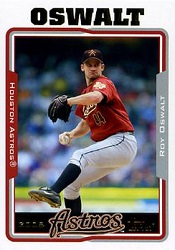 The '04 St. Louis Cardinals won the NL Central with a 96-66 record that was the best in the National League, this was not unexpected as the real Cards went 105-57 before losting in the '04 World Series to Boston, and figured to be a top contender in this league. A powerful lineup was this team's strength, as first baseman Albert Pujols hit .329 with 36 HR, 120 RBI and 117 runs, and he had support from centerfielder Jim Edmonds (.298, 44 HR, 115 RBI) and third baseman Scott Rolen (.326, 40 HR, 121 RBI). Others like Edgar Renteria, Tony Womack and Reggie Sanders added depth to the offense. While the rotation may have lacked stars, it was solid as all five starters recorded 10+ wins - Chris Carpenter (15-4, 3.68 ERA), Jason Marquis (16-12, 4.00 ERA), Jeff Suppan (12-10, 4.29 ERA), Woody Williams (12-9, 4.32 ERA) and Matt Morris (13-11, 4.81 ERA). Jason Isringhausen notched 48 saves and a 2.67 ERA in the bullpen that was also solid. The '08 Chicago Cubs finished a distant second place with a 89-73 record (real-life 97-64, lost NLDS) and just missed a wildcard berth. Another strong offense featured third baseman Aramis Ramirez (.309, 27 HR, 116 RBI), Derrek Lee (just 11 HR, but .276 with 99 runs), Alfonso Soriano (24 HR, 77 RBI), catcher Geovany Soto (20 HR, 95 RBI) and light-hitting Ryan Theriot (.307, 85 runs). Starting pitchers Ryan Dempster (14-6, 2.98 ERA) and Carlos Zambrano (14-8, 3.51 ERA), along with Ted Lilly (11-5, 4.09 ERA) had good years, while closer Kerry Wood recorded 20 saves with a 3.91 ERA. The '04 Houston Astros finished third place with an 84-78 record, remaining in the playoff hunt until September (real-life 92-70, lost NLCS). The offense was led by Jeff Kent (.248, 28 HR, 110 RBI), Lance Berkman (.311, 30 HR, 105 RBI, 111 runs) and part-time Carlos Beltran (.372, 13 HR, 47 RBI in 75 games). Other contributors included long-term Astros stars Craig Biggio (.254, 23 HR, 85 runs) and Jeff Bagwell (.236, 24 HR, 88 RBI). The pitching rotation was a two-man show, as Roy Oswalt (17-10, 3.19 ERA, 223 K's) and Roger Clemens (15-7, 2.93 ERA, 232 K's) were outstanding, but had little help. In the bullpen, Brad Lidge posted 22 saves and a strong 2.26 ERA.
The '04 St. Louis Cardinals won the NL Central with a 96-66 record that was the best in the National League, this was not unexpected as the real Cards went 105-57 before losting in the '04 World Series to Boston, and figured to be a top contender in this league. A powerful lineup was this team's strength, as first baseman Albert Pujols hit .329 with 36 HR, 120 RBI and 117 runs, and he had support from centerfielder Jim Edmonds (.298, 44 HR, 115 RBI) and third baseman Scott Rolen (.326, 40 HR, 121 RBI). Others like Edgar Renteria, Tony Womack and Reggie Sanders added depth to the offense. While the rotation may have lacked stars, it was solid as all five starters recorded 10+ wins - Chris Carpenter (15-4, 3.68 ERA), Jason Marquis (16-12, 4.00 ERA), Jeff Suppan (12-10, 4.29 ERA), Woody Williams (12-9, 4.32 ERA) and Matt Morris (13-11, 4.81 ERA). Jason Isringhausen notched 48 saves and a 2.67 ERA in the bullpen that was also solid. The '08 Chicago Cubs finished a distant second place with a 89-73 record (real-life 97-64, lost NLDS) and just missed a wildcard berth. Another strong offense featured third baseman Aramis Ramirez (.309, 27 HR, 116 RBI), Derrek Lee (just 11 HR, but .276 with 99 runs), Alfonso Soriano (24 HR, 77 RBI), catcher Geovany Soto (20 HR, 95 RBI) and light-hitting Ryan Theriot (.307, 85 runs). Starting pitchers Ryan Dempster (14-6, 2.98 ERA) and Carlos Zambrano (14-8, 3.51 ERA), along with Ted Lilly (11-5, 4.09 ERA) had good years, while closer Kerry Wood recorded 20 saves with a 3.91 ERA. The '04 Houston Astros finished third place with an 84-78 record, remaining in the playoff hunt until September (real-life 92-70, lost NLCS). The offense was led by Jeff Kent (.248, 28 HR, 110 RBI), Lance Berkman (.311, 30 HR, 105 RBI, 111 runs) and part-time Carlos Beltran (.372, 13 HR, 47 RBI in 75 games). Other contributors included long-term Astros stars Craig Biggio (.254, 23 HR, 85 runs) and Jeff Bagwell (.236, 24 HR, 88 RBI). The pitching rotation was a two-man show, as Roy Oswalt (17-10, 3.19 ERA, 223 K's) and Roger Clemens (15-7, 2.93 ERA, 232 K's) were outstanding, but had little help. In the bullpen, Brad Lidge posted 22 saves and a strong 2.26 ERA.
The '08 Milwaukee Brewers went 78-84, good for a fourth place finish (real-life 90-72, lost NLDS). Outfielder Ryan Braun (.269, 37 HR, 104 RBI) and first baseman Prince Fielder (.256, 37 HR, 97 RBI, 101 runs) were the strength of the offense, but others like J.J. Hardy (.284, 23 HR, 81 runs), Corey Hart (.253, 21 HR, 80 RBI) and Mike Cameron (.224, 28 HR) were key contributors. A relatively weak pitching staff was bolstered mid-season by the addition of C.C. Sabathia (10-3, 1.57 ERA in 14 starts), but it wasn't enough as Jeff Suppan (10-7, 5.22 ERA), Ben Sheets (9-13, 3.75 ERA) and Dave Bush (10-10, 3.35 ERA) were merely average. The '04 Pittsburgh Pirates finished 63-99 (real-life 72-89), one of the worst teams in the league - a mediocre offense featured outfielders Jason Bay (.310, 30 HR, 93 RBI) and Craig Wilson (33 HR, 103 RBI) and cather Jason Kendall (.305, 75 runs) but not much else, while the pitching was also very limited, with Oliver Perez (12-13, 3.67 ERA, 256 K's) the best of the group, and the only one to win dougle-digit games. An aging Jose Mesa did record 28 saves. The '06 Cincinnati Reds finished 61-101, last place in the Central (real-life 80-82). The offense had no stars, and the biggest contributors included slugger Adam Dunn (31 HR, 72 RBI, 202 strikeouts!), Brandon Phillips (.257, 14 HR, 66 RBI), Ryan Freel (.247, 70 runs, 39 steals) and an aging Ken Griffey Jr. (.261, 17 HR, 49 RBI in 119 games). Future Cubs hero David Ross did hit 22 homers in limited playing time. There were bright spots in the rotation, as Bronson Arroyo (13-6, 2.72 ERA, 218 K's) and Aaron Harang (9-16, 3.45 ERA, 206 K's) were both very good, but there was little else.
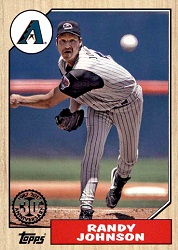 The NL West featured four teams that were in the running for the playoffs up to the final week. The '09 Los Angeles Dodgers (94-68) edged the '02 San Francisco Giants (92-70) for the division title after going back-and-forth all year. The Giants did earn the NL's wildcard spot, edging out competitive teams like the Cubs and Braves. The Dodgers (real-life 95-67, lost NLCS) had a very balanced team - the offense was led by Andre Ethier (.269, 30 HR, 108 RBI) and had plenty of depth from players such as outfielder Matt Kemp (.299, 26 HR, 104 RBI, 31 steals), Manny Ramirez (.284, 19 HR, 68 RBI in 106 games), James Loney (.320, 12 HR, 79 RBI), Juan Pierre (.307, 62 runs, 30 steals) and role-players like Rafael Furcal, Casey Blake and Russell Martin. Lefty Randy Wolf (15-8, 3.66 ERA) led the team in wins and innings, but other reliable starters included Chad Billingsley (9-9, 3.69 ERA) and a young Clayton Kershaw (9-6, 2.35 ERA). Intimidating closer Jonathan Broxton recorded 29 saves with a sparkling 1.55 ERA and the bullpen overall was better-than-average. The Giants (real-life 95-66, lost World Series) were better than I had remembered - of course a lot of that is due to the incredible Barry Bonds (.366, 40 HR, 103 RBI, 143 runs, 189 walks!), but this team had many excellent players - Jeff Kent (.327, 33 HR, 137 RBI, 104 runs), David Bell (.250, 20 HR, 89 RBI), Reggie Sanders (.236, 21 HR, 69 RBI) and Benito Santiago (.264, 18 HR, 83 RBI) were also strong, while others like Rich Aurilia and J.T. Snow didn't stand out on the stat sheet, but were solid players. The Giants had a solid rotation that featured Russ Ortiz (14-11, 3.67 ERA), Kirk Rueter (13-7, 3.14 ERA), Livan Hernandez (12-12, 4.71 ERA) and Jason Schmidt (10-7, 4.07 ERA). The bullpen was also very good with Felix Rodriguez (72 games, 3.03 ERA) and closer Robb Nen (45 saves, 1.67 ERA). The '02 Arizona Diamondbacks finished third place with a strong 88-74 record (real-life 98-64, lost NLDS, reason for not picking '01 championship team is listed above). Outfielders Luis Gonzalaez (.285, 26 HR, 104 RBI, 103 runs) and Steve Finley (.297, 23 HR, 107 RBI) led the offense, while other contributors included Tony Womack (.278, 77 runs, 29 steals) and Junior Spivey (.291, 12 HR, 88 runs). The rotation featured two all-time greats, as Curt Schilling (14-8, 2.23 ERA, 343 K's) led the NL in ERA and strikeouts, while Randy Johnson (18-10, 3.04 ERA, 330 K's) led the league in wins. Miguel Batista and Rick Helling also each won 11 games, and Byung-Hyun Kim recorded 24 saves with a low 1.62 ERA.
The NL West featured four teams that were in the running for the playoffs up to the final week. The '09 Los Angeles Dodgers (94-68) edged the '02 San Francisco Giants (92-70) for the division title after going back-and-forth all year. The Giants did earn the NL's wildcard spot, edging out competitive teams like the Cubs and Braves. The Dodgers (real-life 95-67, lost NLCS) had a very balanced team - the offense was led by Andre Ethier (.269, 30 HR, 108 RBI) and had plenty of depth from players such as outfielder Matt Kemp (.299, 26 HR, 104 RBI, 31 steals), Manny Ramirez (.284, 19 HR, 68 RBI in 106 games), James Loney (.320, 12 HR, 79 RBI), Juan Pierre (.307, 62 runs, 30 steals) and role-players like Rafael Furcal, Casey Blake and Russell Martin. Lefty Randy Wolf (15-8, 3.66 ERA) led the team in wins and innings, but other reliable starters included Chad Billingsley (9-9, 3.69 ERA) and a young Clayton Kershaw (9-6, 2.35 ERA). Intimidating closer Jonathan Broxton recorded 29 saves with a sparkling 1.55 ERA and the bullpen overall was better-than-average. The Giants (real-life 95-66, lost World Series) were better than I had remembered - of course a lot of that is due to the incredible Barry Bonds (.366, 40 HR, 103 RBI, 143 runs, 189 walks!), but this team had many excellent players - Jeff Kent (.327, 33 HR, 137 RBI, 104 runs), David Bell (.250, 20 HR, 89 RBI), Reggie Sanders (.236, 21 HR, 69 RBI) and Benito Santiago (.264, 18 HR, 83 RBI) were also strong, while others like Rich Aurilia and J.T. Snow didn't stand out on the stat sheet, but were solid players. The Giants had a solid rotation that featured Russ Ortiz (14-11, 3.67 ERA), Kirk Rueter (13-7, 3.14 ERA), Livan Hernandez (12-12, 4.71 ERA) and Jason Schmidt (10-7, 4.07 ERA). The bullpen was also very good with Felix Rodriguez (72 games, 3.03 ERA) and closer Robb Nen (45 saves, 1.67 ERA). The '02 Arizona Diamondbacks finished third place with a strong 88-74 record (real-life 98-64, lost NLDS, reason for not picking '01 championship team is listed above). Outfielders Luis Gonzalaez (.285, 26 HR, 104 RBI, 103 runs) and Steve Finley (.297, 23 HR, 107 RBI) led the offense, while other contributors included Tony Womack (.278, 77 runs, 29 steals) and Junior Spivey (.291, 12 HR, 88 runs). The rotation featured two all-time greats, as Curt Schilling (14-8, 2.23 ERA, 343 K's) led the NL in ERA and strikeouts, while Randy Johnson (18-10, 3.04 ERA, 330 K's) led the league in wins. Miguel Batista and Rick Helling also each won 11 games, and Byung-Hyun Kim recorded 24 saves with a low 1.62 ERA.
The '07 Colorado Rockies finished fourth place, but with a solid 85-77 record (real-life 90-73, lost World Series) - like most Colorado teams, the offense was strong and the pitching was lacking. Outfielder Matt Holliday (.303, 32 HR, 121 RBI, 106 runs) and first baseman Todd Helton (.303, 24 HR, 110 runs, 100 RBI) were the biggest names, but others like shortstop Troy Tulowitzki (.291, 24 HR, 95 RBI), Garrett Atkins (.291, 23 HR, 93 RBI) and Brad Hawpe (.273, 31 HR, 96 RBI) put up big power numbers. Willy Taveras and Kazuo Matsui combined for 70 steals. Jeff Francis was the best of the pitchers (14-9, 4.43 ERA), and only Aaron Cook (12-10, 4.85 ERA) recorded double-digit wins. The bullpen lacked any great arms and nobody recorded double-digit saves. The '07 San Diego Padres finished last place with a 72-90 record, but they were not a dull team - the real-life Padres tied with Colorado for the wildcard, one game back of division winner Arizona, and played a 163rd game to decide the wildcard, with the Padres losing to finish 89-74, and out of the playoffs. The Padres offense featured all-star first baseman Adrian Gonzalez (.289, 27 HR, 109 RBI) and support from Khalil Greene (.254, 27 HR, 97 RBI), Kevin Kouzmanoff and Brian Giles. Ace Jake Peavy (16-8, 2.91 ERA, 257 K's) was outstanding as expected, but they lacked depth, with an aging Greg Maddux (12-16, 4.29 ERA) being the best of the rest. Trevor Hoffman did record 38 saves, but his ERA wasn't great in this league at just 3.88.
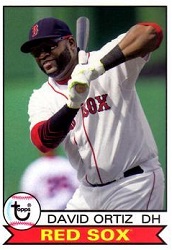 The '04 Boston Red Sox are probably the most known team from this decade - they were the team that broke the 86 year curse, including coming back from a 3-0 deficit in the ALCS vs the rival Yankees. The real-life Red Sox went 98-64, coming in 2nd place to the Yankees in the AL East before winning the title - in this replay they won the East after being pushed all summer by the Yankees and Rays, finishing with a 93-69 record. Ace Curt Schilling was amazing, finishing with a 23-4 record, AL-best 2.67 ERA and 194 strikeouts, while former ace Pedro Martinez (13-10, 4.19 ERA, 205 K's) was also very good. Tim Wakefield, Bronson Arroyo and Derek Lowe rounded out the rotation - they weren't great, but they did eat up innings. Keith Foulke recorded 22 saves and a sparkling 1.34 ERA before having a terrible playoffs. DH David Ortiz (.327, 44 HR, 143 RBI, 112 runs) and outfielder Manny Ramirez (.288, 39 HR, 124 RBI, 105 runs) led the offense, but it was a deep group that included Johnny Damon (.318, 112 runs, 24 steals), catcher Jason Varitek (.256, 19 HR, 77 RBI), Bill Mueller and Kevin Millar. The '09 New York Yankees finished 85-77, good for second place in the AL East (real-life 103-59, won World Series) - Another strong offense that featured shortstop Derek Jeter (.336, 18 HR, 127 RBI, 31 steals), second baseman Robinson Cano (.325, 20 HR, 105 RBI) and first baseman Mark Teixeira (.264, 30 HR, 119 RBI), as well as Johnny Damon (.287, 100 runs), Hideki Matsui (.277, 88 RBI), catcher Jorge Posada (.268, 20 HR, 68 RBI) and of course the controversial third baseman Alex Rodriguez, who despite missing roughly a month still hit .275 with 32 homers and 91 RBI. Lefty C.C. Sabathia (17-8, 3.41 ERA, 196 K's) was the ace of the staff, while A.J. Burnett (15-12, 4.52 ERA) and Andy Pettitte (10-9, 4.73 ERA) also recorded double-digit wins. Closer Mariano Rivera struggled at times, but still recorded 26 saves and a 3.68 ERA. The '08 Tampa Bay Rays finished 84-78, good for third place. A spunky team that few expected to be this good, the real-life Rays went 97-65 before losing the World Series. They may not have had stars, but key players included slugger Carlos Pena (29 HR, 93 RBI), young third baseman Evan Longoria (.264, 28 HR, 89 RBI) and speedy center fielder B.J. Upton (.283, 106 runs, 54 steals). The pitching staff included James Shields (14-8, 3.95 ERA), Scott Kazmir (11-7, 4.10 ERA), Matt Garza (11-11, 3.60 ERA) and journeyman Edwin Jackson (10-8, 4.67 ERA). The bullpen lacked big names and was overall average.
The '04 Boston Red Sox are probably the most known team from this decade - they were the team that broke the 86 year curse, including coming back from a 3-0 deficit in the ALCS vs the rival Yankees. The real-life Red Sox went 98-64, coming in 2nd place to the Yankees in the AL East before winning the title - in this replay they won the East after being pushed all summer by the Yankees and Rays, finishing with a 93-69 record. Ace Curt Schilling was amazing, finishing with a 23-4 record, AL-best 2.67 ERA and 194 strikeouts, while former ace Pedro Martinez (13-10, 4.19 ERA, 205 K's) was also very good. Tim Wakefield, Bronson Arroyo and Derek Lowe rounded out the rotation - they weren't great, but they did eat up innings. Keith Foulke recorded 22 saves and a sparkling 1.34 ERA before having a terrible playoffs. DH David Ortiz (.327, 44 HR, 143 RBI, 112 runs) and outfielder Manny Ramirez (.288, 39 HR, 124 RBI, 105 runs) led the offense, but it was a deep group that included Johnny Damon (.318, 112 runs, 24 steals), catcher Jason Varitek (.256, 19 HR, 77 RBI), Bill Mueller and Kevin Millar. The '09 New York Yankees finished 85-77, good for second place in the AL East (real-life 103-59, won World Series) - Another strong offense that featured shortstop Derek Jeter (.336, 18 HR, 127 RBI, 31 steals), second baseman Robinson Cano (.325, 20 HR, 105 RBI) and first baseman Mark Teixeira (.264, 30 HR, 119 RBI), as well as Johnny Damon (.287, 100 runs), Hideki Matsui (.277, 88 RBI), catcher Jorge Posada (.268, 20 HR, 68 RBI) and of course the controversial third baseman Alex Rodriguez, who despite missing roughly a month still hit .275 with 32 homers and 91 RBI. Lefty C.C. Sabathia (17-8, 3.41 ERA, 196 K's) was the ace of the staff, while A.J. Burnett (15-12, 4.52 ERA) and Andy Pettitte (10-9, 4.73 ERA) also recorded double-digit wins. Closer Mariano Rivera struggled at times, but still recorded 26 saves and a 3.68 ERA. The '08 Tampa Bay Rays finished 84-78, good for third place. A spunky team that few expected to be this good, the real-life Rays went 97-65 before losing the World Series. They may not have had stars, but key players included slugger Carlos Pena (29 HR, 93 RBI), young third baseman Evan Longoria (.264, 28 HR, 89 RBI) and speedy center fielder B.J. Upton (.283, 106 runs, 54 steals). The pitching staff included James Shields (14-8, 3.95 ERA), Scott Kazmir (11-7, 4.10 ERA), Matt Garza (11-11, 3.60 ERA) and journeyman Edwin Jackson (10-8, 4.67 ERA). The bullpen lacked big names and was overall average.
The '08 Toronto Blue Jays finished a respectable 80-82 (real-life 86-76) and featured one of the best pitchers in this replay in starter Roy Halladay (18-10, 210 K's, 3.52 ERA) - after a slow start, he was downright dominant the final two months. A.J. Burnett (13-12, 199 K's, 4.91 ERA) and Jesse Litsch (12-8, 3.62 ERA) added depth to the rotation. Closer B.J. Ryan recorded 35 saves, but struggled with a 4.63 ERA. The offense lacked major power, but had several good players like outfielder Vernon Wells (.322, 17 HR, 76 RBI), Alex Rios (.295, 18 HR, 118 runs, 79 RBI, 29 steals) and first baseman Lyle Overbay (.272, 17 HR, 84 runs, 74 RBI). The '08 Baltimore Orioles finished 64-98, last place by a mile (real-life 68-93). The O's had a rough decade and figured to struggle in this difficult division. The offense wasn't all that bad, featuring Nick Markakis (.305, 20 HR, 118 runs, 85 RBI), slugger Aubrey Huff (.271, 34 HR, 121 RBI, 107 runs), second baseman Brian Roberts (.293, 94 runs, 37 steals) and Melvin Mora (.279, 22 HR, 83 RBI). Pitching however, was the team's clear weakness - only starter Jeremy Guthrie (10-8, 3.53 ERA) hit double-figures in wins, while fellow starter Daniel Cabrera went just 4-19 with a terrible 7.80 ERA in 32 starts. Closer George Sherill also struggled, recording just 11 saves with a poor 5.54 ERA.
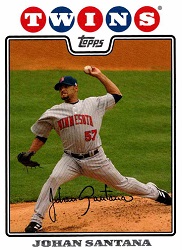 The '06 Minnesota Twins were a bit of a surprise, running away with the AL Central ahead of other teams like Chicago and Detroit that I expected to be just as good, if not better. The Twins finished 89-73, five games ahead of the White Sox (real-life Twins were 96-66 before being swept in the ALDS). Ace lefty Johan Santana was outstanding, going 20-8 with a 3.26 ERA and 242 strikeouts, but the rest of the rotation was medicore, featuring Carlos Silva (9-17, 5.82 ERA), Brad Radke and an injury-limited Francisco Liriano (9-2, 2.59 ERA, 152 K's in just 18 starts). Closer Joe Nathan was excellent with 39 saves and a 1.74 ERA. The offense featured a couple of stars in catcher Joe Mauer (.300, 12 HR, 94 runs, 74 RBI) and first baseman Justin Morneau (.320, 30 HR, 118 RBI, 102 runs), but there was depth with players like outfielder Michael Cuddyer (.291, 22 HR, 102 RBI), fellow outfielder Torii Hunter (.291, 31 HR, 111 RBI) and speedy second baseman Luis Castillo (.273, 86 runs, 25 steals). The '05 Chicago White Sox were in the running all year, at least for a wildcard, before fading down the stretch, finishing with an 84-78 record. The real-life White Sox are well-known, going 99-63 and winning a World Series after a long drought of their own. The balanced roster included offense from outstanding first baseman Paul Konerko (.281, 44 HR, 139 RBI, 110 runs), as well as outfielder Jermaine Dye (.284, 36 HR, 101 runs, 98 RBI), third baseman Joe Crede (.285, 26 HR, 81 RBI), speedy center fielder Scott Podsednik (.303, 78 runs, 51 steals), as well as Aaron Rowand, Carl Everett and Tadahito Iguchi. The rotation was led by lefty Mark Buehrle (18-12, 3.70 ERA), but was deep with players like Jon Garland (16-11, 4.19 REA), Freddy Garcia (10-17, 4.39 ERA) and Jose Contreras (11-11, 4.23 ERA). Closer Dustin Hermanson led the team with 32 saves and was bolstered late in the year with Bobby Jenks. The '06 Detroit Tigers were a bit disappointing, finishing 82-80 and third place in the Central. In real-life, the '06 Tigers went 95-67 before losing in the World Series. A very deep lineup featured outfielder Magglio Ordonez (.292, 22 HR, 90 RBI), catcher Pudge Rodriguez (.268, 63 RBI), third baseman Brandon Inge (.282, 29 HR, 89 RBI), Craig Monroe (.25 HR, 79 RBI) and Marcus Thames (23 HR, 71 RBI), as well as Carlos Guillen, Curtis Granderson and Placido Polanco. The rotation featured a young Justin Verlander, who struggled at times and finished 11-13 with a 3.70 ERA. Other starters included Jeremy Bonderman (13-11, 4.33 ERA, 216 K's), Kenny Rogers (12-11, 4.36 ERA) and Nate Robertson (11-8, 4.46 ERA). An excellent bullpen featured Todd Jones (15 saves), Joel Zumaya (17 saves) and Fernando Rodney (5 saves).
The '06 Minnesota Twins were a bit of a surprise, running away with the AL Central ahead of other teams like Chicago and Detroit that I expected to be just as good, if not better. The Twins finished 89-73, five games ahead of the White Sox (real-life Twins were 96-66 before being swept in the ALDS). Ace lefty Johan Santana was outstanding, going 20-8 with a 3.26 ERA and 242 strikeouts, but the rest of the rotation was medicore, featuring Carlos Silva (9-17, 5.82 ERA), Brad Radke and an injury-limited Francisco Liriano (9-2, 2.59 ERA, 152 K's in just 18 starts). Closer Joe Nathan was excellent with 39 saves and a 1.74 ERA. The offense featured a couple of stars in catcher Joe Mauer (.300, 12 HR, 94 runs, 74 RBI) and first baseman Justin Morneau (.320, 30 HR, 118 RBI, 102 runs), but there was depth with players like outfielder Michael Cuddyer (.291, 22 HR, 102 RBI), fellow outfielder Torii Hunter (.291, 31 HR, 111 RBI) and speedy second baseman Luis Castillo (.273, 86 runs, 25 steals). The '05 Chicago White Sox were in the running all year, at least for a wildcard, before fading down the stretch, finishing with an 84-78 record. The real-life White Sox are well-known, going 99-63 and winning a World Series after a long drought of their own. The balanced roster included offense from outstanding first baseman Paul Konerko (.281, 44 HR, 139 RBI, 110 runs), as well as outfielder Jermaine Dye (.284, 36 HR, 101 runs, 98 RBI), third baseman Joe Crede (.285, 26 HR, 81 RBI), speedy center fielder Scott Podsednik (.303, 78 runs, 51 steals), as well as Aaron Rowand, Carl Everett and Tadahito Iguchi. The rotation was led by lefty Mark Buehrle (18-12, 3.70 ERA), but was deep with players like Jon Garland (16-11, 4.19 REA), Freddy Garcia (10-17, 4.39 ERA) and Jose Contreras (11-11, 4.23 ERA). Closer Dustin Hermanson led the team with 32 saves and was bolstered late in the year with Bobby Jenks. The '06 Detroit Tigers were a bit disappointing, finishing 82-80 and third place in the Central. In real-life, the '06 Tigers went 95-67 before losing in the World Series. A very deep lineup featured outfielder Magglio Ordonez (.292, 22 HR, 90 RBI), catcher Pudge Rodriguez (.268, 63 RBI), third baseman Brandon Inge (.282, 29 HR, 89 RBI), Craig Monroe (.25 HR, 79 RBI) and Marcus Thames (23 HR, 71 RBI), as well as Carlos Guillen, Curtis Granderson and Placido Polanco. The rotation featured a young Justin Verlander, who struggled at times and finished 11-13 with a 3.70 ERA. Other starters included Jeremy Bonderman (13-11, 4.33 ERA, 216 K's), Kenny Rogers (12-11, 4.36 ERA) and Nate Robertson (11-8, 4.46 ERA). An excellent bullpen featured Todd Jones (15 saves), Joel Zumaya (17 saves) and Fernando Rodney (5 saves).
The '07 Cleveland Indians were a good team stuck in a very good division, they finished just 73-89, but were an example of a team that was better than their record showed (real-life 96-66, lost ALCS). Once again, big lefty C.C. Sabathia was the ace of the staff - this time going 14-13 with a 3.08 ERA and 202 strikeouts. He was joined by Fausto Carmona (13-9, 3.71 ERA), Paul Byrd and Jake Westbrook. In the bullpen Joe Borowski recorded 14 saves and Rafael Betancourt recorded 13 with a good 1.46 ERA. The offense was led by slugger Travis Hafner (.250, 28 HR, 100 RBI) and a better-than-expected year from Ryan Garko (.290, 29 HR, 101 RBI). Other contributors include Grady Sizemore (.302, 26 HR, 114 runs, 91 RBI, 27 steals), catcher Victor Martinez (.271, 19 HR, 72 RBI), Jhonny Peralta (.247, 16 HR, 71 RBI) and Casey Blake (.247, 12 HR, 70 RBI). The 2000s were a rough decade for the Kansas City Royals, and their '08 team responded with the worst performance in the entire league, finishing just 55-107 and last in the AL Central. There were a few bright spots however, among pitchers a young Zack Greinke finished 8-14 with a 4.03 ERA and 189 strikeouts, while others like Gil Meche (10-14, 5.14 ERA), Luke Hochevar and Brian Bannister ate up innings. Closer Joakim Soria didn't have many save opportunities, but did record 17 with an excellent 1.20 ERA. The offense struggled, with relative unknown Mark Teahen (.253, 16 HR, 84 RBI) leading the way along with over-achieving catcher Miguel Olivo (.294, 21 HR, 56 RBI), a young Alex Gordon (.267, 13 HR, 71 RBI) and David DeJesus (.277, 14 HR, 88 runs) leading the charge. The 2010s figure to be better for the Royals as they will be represented by their 2015 World Series winning team.
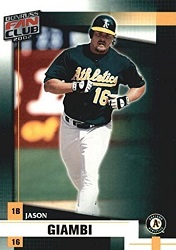 The 2001 Seattle Mariners are a historic team - after losing stars like Ken Griffey Jr., Randy Johnson and Alex Rodriguez in previous years, they exploded on the scene with a modern day record 116 wins. However, when the post-season came, after struggling to get thru the ALDS, they met the Yankees, whom everyone was cheering for in the shadow of the 9/11 terrorist attacks. The Mariners were upset by New York, and never reached such heights again. In this league the Mariners were the only team to win 100+ games, finishing with a 102-60 record, and quickly pulling away from the competition in the AL West. Despite those star players who left, a lot of talent remained - players like DH Edgar Martinez (.334, 32 HR, 112 RBI), suddenly-great Bret Boone (AL Best .361 average, 33 HR, 142 RBI, 128 runs) and veteran John Olerud (.295, 21 HR, 110 RBI) - but the biggest change was that of newcomer Ichiro Suzuki, the right fielder hit .346 with 120 runs and 62 steals and was one of the best defensive outfielders in the game. Other contributors on this team included David Bell (17 HR, 88 RBI), Mike Cameron (33 HR, 91 RBI), Carlos Guillen, Dan Wilson and Mark McLemore. The rotation was solid, as Freddy Garcia starred going 23-6 with a 3.00 ERA and 174 strikeouts, but he had good support from Aaron Sele (14-11, 4.07 ERA), Jamie Moyer (14-13, 4.24 ERA) and Paul Abbott (11-5, 5.36 ERA). Perhaps the biggest strength of this team however was the bullpen, and they were outstanding in this league too - Kaz Sasaki recorded 40 saves with a 2.04 ERA, while others like Jeff Nelson (1.24 ERA), Arthur Rhodes (1.91 ERA) and Norm Charlton (2.88 ERA) were also outstanding. The Oakland A's of this era were outstanding as well, even if they never made it to the World Series. The '01 team represented them here, and they finished a solid 91-71, well back of Seattle, but well ahead of others for the AL Wildcard spot. This team was not short on star power - the rotation featured three excellent starters in Mark Mulder (17-7, 3.52 ERA), Barry Zito (15-6, 3.60 ERA) and Tim Hudson (16-16, 3.93 ERA) - even fourth starter Cory Lidle had a good year (15-9, 4.13 ERA). The bullpen was also good as Jason Isringhausen recorded 18 saves and a 2.27 ERA. First baseman Jason Giambi had a great year, hitting .352 with 44 home runs and 128 RBI (and 134 runs), and he had plenty of support from shortstop Miguel Tejada (.284, 34 HR, 127 RBI), third baseman Eric Chavez (.289, 34 HR, 115 RBI) and a young Johnny Damon (.256, 101 runs, 27 steals). Other contributors to the offense included Terrence Long, Jeremy Giambi, Ramon Hernandez and part-time Jermaine Dye (13 HR, 46 RBI in just 56 games).
The 2001 Seattle Mariners are a historic team - after losing stars like Ken Griffey Jr., Randy Johnson and Alex Rodriguez in previous years, they exploded on the scene with a modern day record 116 wins. However, when the post-season came, after struggling to get thru the ALDS, they met the Yankees, whom everyone was cheering for in the shadow of the 9/11 terrorist attacks. The Mariners were upset by New York, and never reached such heights again. In this league the Mariners were the only team to win 100+ games, finishing with a 102-60 record, and quickly pulling away from the competition in the AL West. Despite those star players who left, a lot of talent remained - players like DH Edgar Martinez (.334, 32 HR, 112 RBI), suddenly-great Bret Boone (AL Best .361 average, 33 HR, 142 RBI, 128 runs) and veteran John Olerud (.295, 21 HR, 110 RBI) - but the biggest change was that of newcomer Ichiro Suzuki, the right fielder hit .346 with 120 runs and 62 steals and was one of the best defensive outfielders in the game. Other contributors on this team included David Bell (17 HR, 88 RBI), Mike Cameron (33 HR, 91 RBI), Carlos Guillen, Dan Wilson and Mark McLemore. The rotation was solid, as Freddy Garcia starred going 23-6 with a 3.00 ERA and 174 strikeouts, but he had good support from Aaron Sele (14-11, 4.07 ERA), Jamie Moyer (14-13, 4.24 ERA) and Paul Abbott (11-5, 5.36 ERA). Perhaps the biggest strength of this team however was the bullpen, and they were outstanding in this league too - Kaz Sasaki recorded 40 saves with a 2.04 ERA, while others like Jeff Nelson (1.24 ERA), Arthur Rhodes (1.91 ERA) and Norm Charlton (2.88 ERA) were also outstanding. The Oakland A's of this era were outstanding as well, even if they never made it to the World Series. The '01 team represented them here, and they finished a solid 91-71, well back of Seattle, but well ahead of others for the AL Wildcard spot. This team was not short on star power - the rotation featured three excellent starters in Mark Mulder (17-7, 3.52 ERA), Barry Zito (15-6, 3.60 ERA) and Tim Hudson (16-16, 3.93 ERA) - even fourth starter Cory Lidle had a good year (15-9, 4.13 ERA). The bullpen was also good as Jason Isringhausen recorded 18 saves and a 2.27 ERA. First baseman Jason Giambi had a great year, hitting .352 with 44 home runs and 128 RBI (and 134 runs), and he had plenty of support from shortstop Miguel Tejada (.284, 34 HR, 127 RBI), third baseman Eric Chavez (.289, 34 HR, 115 RBI) and a young Johnny Damon (.256, 101 runs, 27 steals). Other contributors to the offense included Terrence Long, Jeremy Giambi, Ramon Hernandez and part-time Jermaine Dye (13 HR, 46 RBI in just 56 games).
The '02 Anaheim Angels finished 85-77 and were contending for a wildcard into September before Oakland pulled away in the final weeks. The real-life Angels of course won the World Series over the Giants in seven games after finishing with a 99-63 record, behind the A's, but winning the title as a wildcard. This team had plenty of offense, led by outfielder Garrett Anderson (.295, 30 HR, 114 RBI, 106 runs) and supported by sluggers Tim Salmon (.317, 27 HR, 105 RBI) and Troy Glaus (.253, 37 HR, 109 RBI). Scrappy David Eckstein (.286, 105 runs, 23 steals), Darin Erstad (.285, 75 RBI, 21 steals) and Adam Kennedy (.294, 72 runs, 20 steals) provided speed to balance with the power. The rotation lacked top guys, but Jarrod Washburn (12-12, 4.35 ERA), Kevin Appier (11-9, 4.35 ERA), Ramon Ortiz (13-13, 4.65 ERA) and Aaron Sele (7-8, 4.70 ERA) proved durable, and they got a mid-season boost from John Lackey (5-7, 4.40 ERA). The bullpen saw Troy Percival get 25 saves with a mediocre 3.55 ERA, while others like Ben Weber and Brendan Donnelly also flourished. Young Francisco 'K-Rod' Rodriguez made just five appearances, but his future was bright. The '04 Rangers (real-life 89-73) were a good team, but faced very stiff competition in the AL West, and finished with just a 73-89 record. The offense had plenty of pop, as nine players hit double-figures in home runs, led by first baseman Mark Teixeira (.277, 38 HR, 106 RBI), and getting support from others like Hank Blalock (.243, 31 HR, 96 RBI), Alfonso Soriano (.250, 30 HR, 91 RBI) and Michael Young (.280, 25 HR, 99 runs). Others, like Kevin Mench, catcher Rod Barajas, David Dellucci and Gary Matthews Jr. provided plenty of support. Pitching however, was a problem, with only durable lefty Kenny Rogers (10-17, 5.43 ERA) winning 10+ games. Others like Ryan Drese (7-15, 4.73 ERA), R.A. Dickey, Joaquin Benoit and Chan Ho Park struggled in this rugged league. Francisco Cordero recorded 18 saves and a 2.12 ERA but as with last place teams, save opportunities were limited.
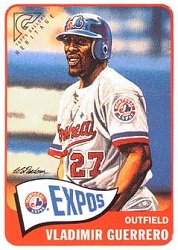 While there were no perfect games in this replay, there was one no-hitter. On July 5th, Atlanta's Russ Ortiz no-hit the Montreal Expos, striking out nine and walking one in an 8-0 victory. Ortiz, also a member of the 2002 Giants, threw a one-hitter for them against the Mets. Arizona's Curt Schilling led the league with 343 strikeouts, so it's no surprise he had the highest single game strikeout mark with 16 against the Colorado Rockies on September 24th. Milwaukee's CC Sabathia struck out 15 against the Cubs for the next highest mark.
While there were no perfect games in this replay, there was one no-hitter. On July 5th, Atlanta's Russ Ortiz no-hit the Montreal Expos, striking out nine and walking one in an 8-0 victory. Ortiz, also a member of the 2002 Giants, threw a one-hitter for them against the Mets. Arizona's Curt Schilling led the league with 343 strikeouts, so it's no surprise he had the highest single game strikeout mark with 16 against the Colorado Rockies on September 24th. Milwaukee's CC Sabathia struck out 15 against the Cubs for the next highest mark.
Toronto's Vernon Wells had the season's longest hit streak at 25 games, just edging Atlanta's Gary Sheffield, who had a 24 game hit streak. Montreal's Vladimir Guerrero hit four home runs on July 31st against the St. Louis Cardinals in a 19-7 victory, driving in nine runs. Three home runs in a game happened 13 times, with Milwaukee's Ryan Braun doing it twice. Three players hit for the cycle, Atlanta's Marcus Giles, Los Angeles' Matt Kemp and New York's David Wright.
The All Star game was held July 15th at St. Louis Busch Stadium. Johan Santana started for the American League against Randy Johnson for the National League (Johnson started for the AL in the 90's All Star Game). The National League wins a close one by a 2-1 score. With the game tied 1-1 in the 7th inning, Mets' David Wright hits a home run off Pedro Martinez that puts the NL ahead, and relievers John Smoltz, Trevor Hoffman and Brad Lidge shut the door on the AL the rest of the way. Chris Carpenter of the Cardinals gets the win, while Martinez takes the loss.
All Star Game: National 2; American 1
See the complete daily posts on the Action! PC message board